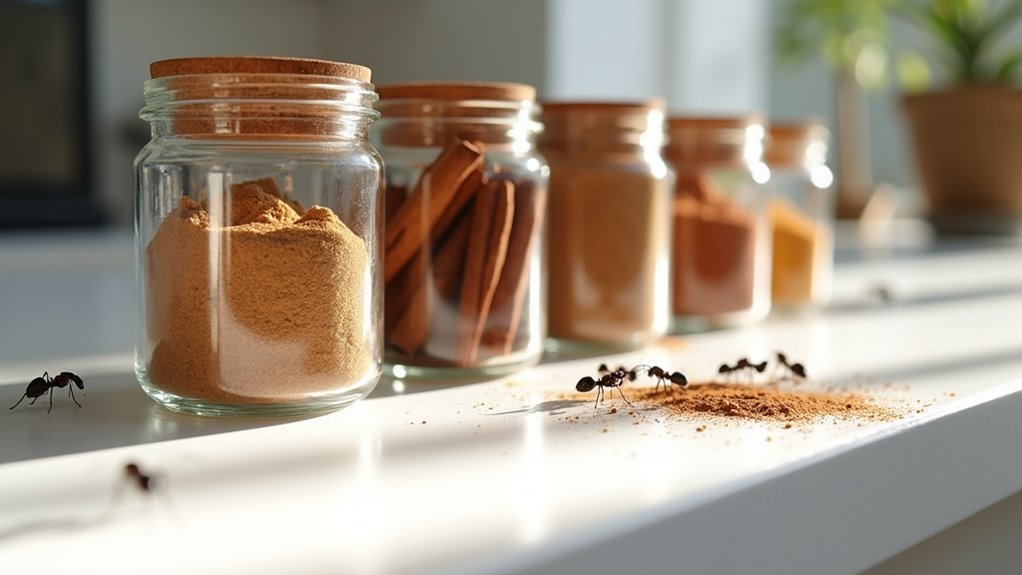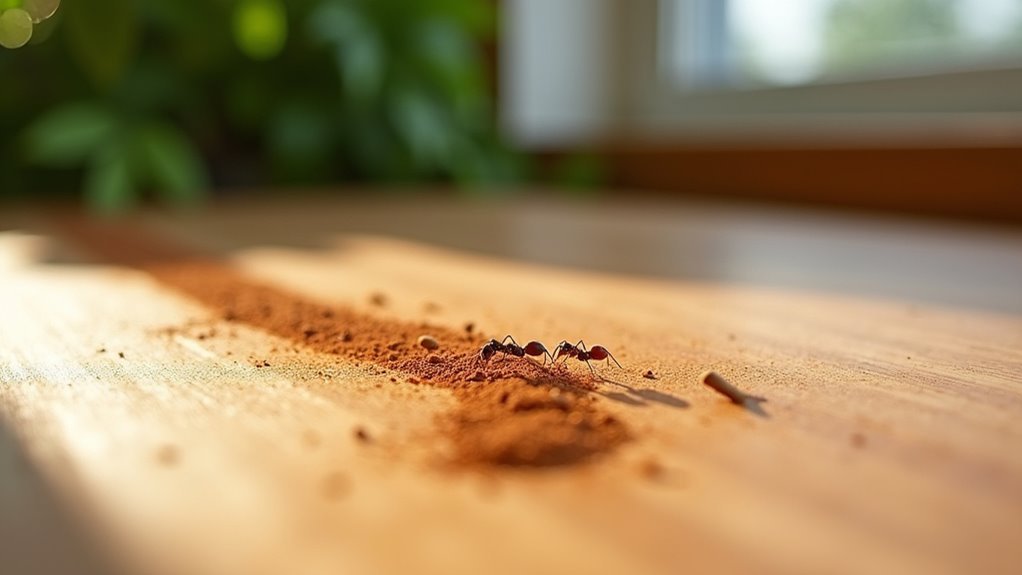Cinnamon repels ants from your home by disrupting their pheromone communication system. The compound cinnamaldehyde in cinnamon interferes with ants’ sensory receptors, causing them to lose their ability to follow scent trails that guide them to food sources. This powerful scent fundamentally jams the chemical messages ants use to navigate and coordinate with their colony, leading to confused foraging patterns and ineffective communication. However, not all cinnamon types work equally well, and proper application techniques can greatly impact your success rate.
How Cinnamon’s Scent Disrupts Ant Communication

When you sprinkle cinnamon around ant-prone areas, you’re fundamentally jamming their communication system. Ants depend on pheromone trails to navigate and signal food locations to their colony members. Cinnamon’s powerful scent masks these chemical messages, leaving ants confused and unable to follow established pathways.
The volatile compounds in cinnamon, particularly cinnamaldehyde, directly interfere with ants’ sensory receptors. This disruption makes it nearly impossible for them to detect the subtle pheromone signals that coordinate their foraging activities.
Without these chemical cues, ants can’t effectively communicate with each other or maintain their organized colonies. This sensory interference is why cinnamon can successfully repel ants from your home. By blocking their primary communication method, you’re creating an environment where they simply can’t function normally.
The Science Behind Cinnamon’s Ant-Repelling Properties
Understanding the specific compounds that make cinnamon so effective against ants reveals why this common spice works so well as a natural deterrent. The active ingredient cinnamaldehyde interferes with ants’ ability to follow scent trails, disrupting their essential communication system.
Cinnamaldehyde disrupts ants’ scent-trail navigation, making cinnamon an effective natural deterrent that blocks their essential communication pathways.
Research shows that cinnamon essential oil delivers markedly more potent results than cinnamon powder you’ll find in your kitchen cabinet.
Here’s what makes cinnamon so effective:
- Concentrated aroma – The strong scent creates an invisible barrier ants won’t cross
- Chemical disruption – Cinnamaldehyde blocks their navigation abilities permanently
- Oil superiority – Studies prove cinnamon essential oil requires only 30 droplets to repel ants effectively
When you apply cinnamon at entry points, you’re creating a chemical obstacle that fundamentally disrupts how ants operate.
Different Types of Cinnamon for Pest Control

Two distinct varieties of cinnamon offer different levels of effectiveness when you’re battling ant invasions.
Ceylon cinnamon, known as “true cinnamon,” contains higher concentrations of beneficial compounds that make it more effective against ants than the widely available Cassia cinnamon.
While Cassia’s less expensive and easier to find, you’ll get better results with Ceylon’s superior potency.
For maximum pest control impact, you should consider cinnamon oil instead of ground spice.
Studies show that cinnamon oil considerably outperforms powdered varieties, requiring fewer applications to achieve the same results.
You’ll need approximately 30 droplet applications for effective ant deterrence.
Remember that quality matters—lower-grade cinnamon products won’t deliver the pest control results you’re seeking, so invest in high-quality options.
Proper Placement of Cinnamon Around Entry Points
Strategic placement determines whether your cinnamon barrier successfully keeps ants at bay or becomes just another ineffective home remedy.
You’ll need to identify where ants actually enter your home before applying any deterrent.
Focus on these key areas when placing cinnamon near potential access routes:
- Doorways and windowsills – Sprinkle powdered cinnamon directly along thresholds and window frames where ants commonly enter.
- Cracks and crevices – Apply cinnamon powder into small gaps in walls, baseboards, and foundation areas.
- Trail disruption zones – Create barrier lines across areas where you’ve observed ant activity.
For larger perimeters, mix cinnamon essential oil with water and spray around your home’s exterior.
Remember to reapply regularly, especially after cleaning, to maintain effective deterring ants coverage at all entry points.
Creating Effective Cinnamon Barriers Along Ant Trails

Once you’ve located ant trails in your home, you’ll need to create continuous cinnamon barriers that physically block their movement and disrupt their chemical communication. Sprinkle powdered cinnamon directly along the trails to create an effective barrier that breaks their scent pathways.
| Method | Application | Effectiveness Duration |
|---|---|---|
| Powdered Cinnamon | Thin line across trails | 3-5 days |
| Essential Oil Spray | 30 drops in solution | 5-7 days |
| Oil-Soaked Cotton | Place at trail intersections | 7-10 days |
| Combined Approach | Powder + oil treatment | 10-14 days |
Focus on creating thin, unbroken lines across doorways and windowsills where ants frequently travel. The cinnamon will repel them by overwhelming their chemical sensors, forcing them to find alternative routes or abandon the area entirely.
Cinnamon Essential Oil vs. Ground Cinnamon Powder
When choosing your cinnamon application method, you’ll find that cinnamon essential oil delivers considerably more powerful ant-repelling effects than ground cinnamon powder. The essential oil’s concentrated active compounds create stronger barriers that disrupt ants’ communication more effectively.
Here’s why cinnamon essential oil outperforms ground cinnamon powder:
- Concentration power – Essential oil contains higher levels of active compounds that repel ants more efficiently
- Targeted application – You can apply 30 drops on cotton balls or create sprays for precise placement
- Lasting effectiveness – Oil creates more durable barriers compared to powder’s temporary deterrent effects
While ground cinnamon powder works when sprinkled along ant trails, it’s less potent and offers shorter-lasting results.
Essential oil’s stronger scent provides superior ant control for your home.
Application Methods for Maximum Effectiveness
Since you’ve chosen your preferred cinnamon form, you’ll need to apply it strategically to create effective barriers that ants can’t ignore.
Sprinkle powdered cinnamon directly at entry points and along visible ant trails to disrupt their communication patterns. For essential oils, use cotton swabs to apply concentrated amounts at high-traffic areas where ants frequently appear.
Create versatile control solutions by mixing cinnamon essential oil with water and alcohol in a spray bottle for broader coverage. This allows you to treat larger surfaces efficiently.
Alternatively, place whole cinnamon sticks at doorways and windowsills for mess-free protection.
These application methods require consistent maintenance—reapply every few days to prevent ants from finding alternative routes around weakened barriers.
Why Grocery Store Cinnamon Has Limited Impact
You’ll find that the cinnamon in your spice rack won’t deliver the same ant-repelling punch as the concentrated versions used in scientific studies.
The processing methods that bring cinnamon from bark to your kitchen greatly reduce the potency of its active compounds, leaving you with a weaker product.
That’s why cinnamon essential oils consistently outperform grocery store powder when it comes to actually deterring ants from your home.
Low Concentration Levels
The disappointing reality about grocery store cinnamon is that it simply doesn’t pack enough punch to effectively repel ants.
Laboratory studies reveal that while concentrated cinnamon essential oil considerably deters ants, the powdered form you’ll find at your local store lacks the potency needed for effective ant control.
The active compounds responsible for disrupting ants’ communication and navigation aren’t present in high enough concentrations in common ground cinnamon.
Here’s what you’re dealing with:
- Store-bought cinnamon powder contains minimal essential oils compared to concentrated extracts
- The manufacturing process removes most of the volatile compounds that actually repel ants
- Sprinkling regular cinnamon provides only temporary deterrent effects at best
For real results, you’ll need higher concentrations found in pure cinnamon essential oil.
Processing Reduces Potency
Processing strips away most of cinnamon’s ant-repelling power before it reaches store shelves.
When manufacturers process cinnamon for retail distribution, they remove significant amounts of essential oils that contain the active compounds responsible for repelling ants. This commercial processing dramatically reduces the concentration of these vital ingredients, leaving you with a product that’s far less effective than what researchers use in laboratory studies.
The cinnamon you’ll find in grocery stores simply doesn’t pack the punch needed for serious ant control.
While laboratory studies demonstrate cinnamon’s effectiveness, they rely on concentrated essential oils rather than the processed powder you’re sprinkling around your home. That’s why your kitchen cinnamon might provide only temporary deterrent effects, disappointing you when ants return despite your efforts.
Oil Extract Superiority
While grocery store cinnamon might smell delightful in your pantry, it can’t compete with cinnamon oil’s concentrated ant-repelling power. Laboratory studies prove that cinnamon oil disrupts ant behavior and prevents them from locating food sources, while powdered cinnamon simply doesn’t pack the same punch.
When you’re facing an ant problem, natural repellents like cinnamon oil require proper concentration to work effectively. Consider these key differences:
- Potency levels: Cinnamon oil contains concentrated compounds that grocery store cinnamon lacks
- Application requirements: You’ll need around 30 droplets of cinnamon oil for significant ant deterrence
- Lasting impact: Oil extracts provide long-term population control versus temporary barriers from powdered forms
The concentration gap between these forms explains why many homeowners see limited success with kitchen-grade cinnamon.
Combining Cinnamon With Other Natural Deterrents
Although cinnamon works effectively as a standalone ant deterrent, you’ll achieve superior results by combining it with other natural repellents that target different aspects of ant behavior.
| Combination Method | Primary Action | Application Tips |
|---|---|---|
| Cinnamon + White Vinegar | Masks scent trails while repelling | Mix in spray bottle for surface cleaning |
| Cinnamon + Diatomaceous Earth | Creates physical barrier + dehydration | Sprinkle along ant pathways |
| Cinnamon + Cayenne Pepper | Dual irritation and trail disruption | Apply around entry points |
| Cinnamon + Essential Oils | Amplified pheromone masking | Add peppermint or clove oils |
| Cinnamon + Apple Cider Vinegar | Removes food sources + deterrent | Regular surface cleaning solution |
You can use cinnamon to deter ants more effectively when paired with diatomaceous earth, which physically dehydrates insects upon contact. Essential oils like peppermint enhance cinnamon’s repellent properties by masking pheromone trails that guide ant colonies to food sources.
Common Mistakes When Using Cinnamon for Ant Control
You’re likely making critical errors that undermine cinnamon’s effectiveness against ants.
The biggest mistake is grabbing regular grocery store cinnamon, which contains such low concentrations of active compounds that it won’t deter persistent ant colonies.
You’re also probably sprinkling cinnamon around visible ants without identifying where they’re actually entering your home or what’s attracting them in the first place.
Using Grocery Store Cinnamon
When you grab that familiar jar of ground cinnamon from your spice rack, you’re reaching for a product that contains only trace amounts of the active compounds needed to effectively repel ants. Grocery store cinnamon simply doesn’t pack the punch necessary for serious ant control.
Using cinnamon from your kitchen cabinet might seem convenient, but it’s one of the most common mistakes homeowners make. The powdered form you’ll find in stores lacks the concentrated oils that laboratory studies have proven effective against ants.
- Your grocery store cinnamon provides only temporary deterrent effects
- Ants will simply find alternative routes around the weak spice barrier
- Effective ant repelling requires concentrated cinnamon essential oil, not ground powder
This approach won’t address the root cause of your infestation.
Ignoring the Ant Source
Even the most potent cinnamon essential oil won’t solve your ant problem if you’re ignoring where these pests originate. You can sprinkle cinnamon around doorways and windows, but crawling insects will continue infiltrating your home when their nest remains active nearby.
Different ant species have varying responses to cinnamon, making identification essential for effective control. Without locating and eliminating the source colony, you’re only addressing visible foragers while the main population thrives elsewhere.
These persistent pests will simply find new routes around your cinnamon barriers. Additionally, failing to remove accessible food sources means you’re maintaining the very attraction that draws ants inside.
Cinnamon becomes useless when you’re simultaneously providing reasons for ants to stay.
When Cinnamon Methods Fail to Stop Infestations
Although cinnamon can effectively repel ants in many situations, you’ll find that this natural method doesn’t always provide the lasting solution you’re hoping for. When cinnamon fails to stop infestations, it’s time to reassess your approach and consider more extensive strategies.
Several factors contribute to cinnamon’s limitations:
- Concentration matters – Grocery store cinnamon often lacks the concentrated oils necessary for effective ant deterrence.
- Temporary redirection – Sprinkling cinnamon may simply redirect ants to new routes rather than eliminating them completely.
- Root causes remain – Without addressing moisture sources and food attractions, ants will persist despite cinnamon barriers.
If your cinnamon deterrents aren’t working, you’ll need to locate and eliminate the ant nest. For persistent problems, seeking professional pest control assistance guarantees extensive, long-term solutions that cinnamon alone can’t provide.
Professional Alternatives to DIY Cinnamon Treatments
While cinnamon offers a natural approach to ant control, professional pest control services provide more extensive solutions that address infestations at their source.
Professional removal services bring specialized expertise and advanced tools that surpass what you’ll achieve with home remedies. These specialists can identify specific ant species and customize treatment plans accordingly, using targeted pesticides with proven effectiveness beyond household solutions.
Unlike DIY ant control methods, professionals tackle the root cause rather than just symptoms.
They’ll implement detailed strategies that include follow-up inspections and preventative measures to stop future invasions. This approach saves you time and resources long-term, especially when persistent infestations resist your home remedies.
Professional services offer the thoroughness and reliability that cinnamon treatments can’t match.
Frequently Asked Questions
Does Cinnamon Really Keep Ants Away?
Cinnamon can temporarily repel ants by disrupting their scent trails, but you’ll find grocery store cinnamon isn’t potent enough for significant results. It redirects ants rather than eliminating them or addressing the infestation’s root cause.
Can I Sprinkle Cinnamon Around My House?
You can sprinkle cinnamon around your house’s entry points and ant trails to create barriers. However, you’ll need to reapply it regularly, especially after cleaning, since it only temporarily redirects ants.
What Smell Do Ants Absolutely Hate?
You’ll find that ants absolutely hate cinnamon’s strong scent, which disrupts their communication. They also despise peppermint, vinegar, and citrus smells that mask their pheromone trails and make navigation impossible.
Does Sprinkling Cinnamon Keep Bugs Away?
You can sprinkle cinnamon to temporarily repel ants by disrupting their scent trails. However, it won’t eliminate them completely and may only redirect them to find alternative routes around your home.
In Summary
You’ve learned how cinnamon’s scent disrupts ant communication pathways and creates effective barriers around your home. Remember to place it strategically at entry points and refresh it regularly for best results. While cinnamon works well for minor ant problems, don’t hesitate to call professionals if you’re dealing with large infestations. Combining cinnamon with other natural deterrents will give you the strongest defense against these persistent pests.





Leave a Reply